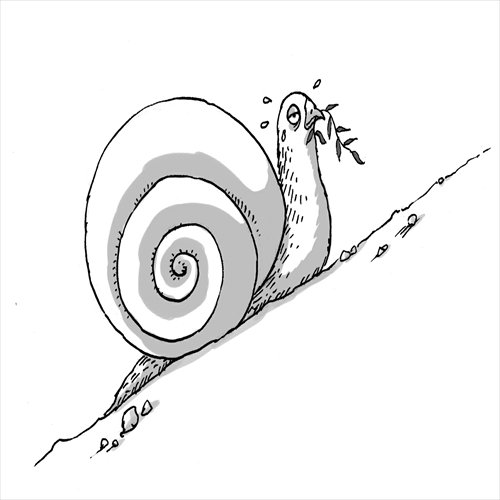


Illustration: Liu Rui/GT
March 31 witnessed the end of a marathon ceasefire negotiation between the Myanmese government and ethnic armed groups. After seven rounds of negotiations since November 2013, peace negotiators of both sides preliminarily signed a draft nationwide ceasefire agreement. The signing, between the government-backed Union Peace-Making Work Committee and ethnic armed groups' National Ceasefire Coordination Team (NCCT), was witnessed by the Myanmese President U Thein Sein. Observers from the UN and China were also present. This landmark agreement is hoped to bring a permanent end to the conflicts which have lasted for decades.
This is certainly a crucial step, and might be a sign of peace and reunification in Myanmar 67 years after its independence. State newspaper Global New Light of Myanmar hailed the agreement as being important as the Panglong Agreement in 1947, the purpose of which was to establish a federal union. The UN also praised the signing of the agreement as a "historic and significant achievement." The draft agreement is hoped to lead to "a larger dialogue for settling the political and military issues," and "pave the way for an inclusive and harmonious future for Myanmar."
This agreement, without any doubt, has helped the Thein Sein government gain enormous credit, which will reinvigorate the ruling Union Solidarity and Development Party before the 2015 general election. Thein Sein has expressed his willingness to achieve permanent peace and national reconciliation before the election, so if he succeeds, his name will be remembered forever.
Meanwhile, by diverting people's attention from thorny issues such as the constitutional revision to the temporary cease-fire, the ruling party can be relieved from the growing social pressures.
However, although the road to national reconciliation and peace has been paved, uncertainties remain prevalent.
One major uncertainty is when this draft ceasefire agreement will be updated to be an official one. Negotiators need to report this draft agreement to their leaders, who will decide where, when and how to sign a final nationwide ceasefire agreement. We can predict how hard it will be to get each of the dozens of armed groups to sign the final agreement when they gather later this month, as each of them has their own vested interests. It is unlikely that all parties can come to terms very quickly.
Besides, the NCCT has warned that the "summit" among ethnic armed groups will probably revise the draft agreement. And it remains unknown how much will be revised.
The second uncertainty is to what extent signing a ceasefire pact really means both sides are willing to stop firing. When both sides were negotiating, the government military forces and the ethnic armed groups such as the Kachin Independence Army and the Myanmar National Democratic Alliance Army (MNDAA) were still exchanging fire.
Besides, the most aggressive and strongest forces such as the MNDAA and the United Wa State Army are not among the signatories. A nationwide ceasefire agreement will only be valid when all ethnic armed groups are included. Otherwise, it's just a piece of paper.
The last uncertainty is that the ceasefire draft is merely a preliminary achievement, and it only scratches the surface of Myanmar's complicated ethnic problems. Long-running military conflicts are a violent manifestation of some deep-rooted issues. Even if a nationwide ceasefire agreement can be reached, it won't be able to address the crux.
In Myanmar's history, the central government has signed quite a few ceasefire agreements, none of which lasted. They ended up making the conflicts more intense.
The ethnic armed groups in northern Myanmar demand a high degree of autonomy, a tough requirement from the perspective of the central government. If this requirement cannot be met, conflicts might recur.
 J-11 fighters in air exercise
J-11 fighters in air exercise Beauties dancing on the rings
Beauties dancing on the rings Attendants-to-be join Mr. & Miss Campus Contest
Attendants-to-be join Mr. & Miss Campus Contest Beijing's toughest anti-smoking law takes effect
Beijing's toughest anti-smoking law takes effect Family lives in cave for about 50 years in SW China
Family lives in cave for about 50 years in SW China PLA soldiers operating vehicle-mounted guns in drill
PLA soldiers operating vehicle-mounted guns in drill Blind carpenter in E China's Jiangxi
Blind carpenter in E China's Jiangxi China hosts overseas disaster relief exercise for the first time
China hosts overseas disaster relief exercise for the first time 20 pairs of twins who will become flight attendants in Sichuan
20 pairs of twins who will become flight attendants in Sichuan Obama is sowing discontent in S.China Sea
Obama is sowing discontent in S.China Sea Rescuers work through night to reach cruise ship survivors
Rescuers work through night to reach cruise ship survivors Driving through limbo
Driving through limbo Facing down MERS
Facing down MERSDay|Week